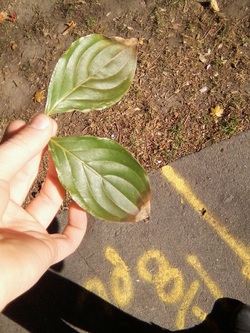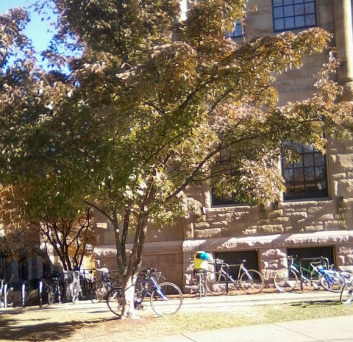|
by Miranda Norlin '17  Cornus kousa leaves. Cornus kousa leaves. You've probably noticed Cornus kousa, those trees around campus that drop round, reddish-pink knobbly fruit. Commonly called Chinese, Japanese or Korean dogwood, C. kousa is widely sold both as an ornamental and as a fruit tree. The species can be identified when not in bloom or fruiting by their distinctive leaves whose veins originate from the center of the leaf and run parallel down to the tip. Though this pattern is distinctive, using the leaves to identify dogwoods around campus might leave you a bit confused. If you wander towards RISD, you'll encounter Cornus florida, the rather different flowering dogwood native to the eastern US. The leaves are very similar, but their fruit, a shiny, compact red berry, is toxic and looks distinctly less appetizing than those of C. kousa. These trees are valued on campus for the lovely white flowers they display every year. Traditionally, Native Americans and soldiers in the civil war used the bark and roots of C. florida as a treatment for malaria. Recent studies have confirmed the presence of antiplasmodial compounds (compounds effective against the plasmodium parasites that cause malaria) but suggest other factors must contribute to the purported anti-malarial effect because the antiplasmodial compounds found are not strong enough to explain the dogwood’s historic use. Further research might reveal chemicals that support the immune system or reduce fever (1). Until such medicinal value is confirmed, Brown students will have to be satisfied with consuming C. kousa fruit and appreciating both on-campus Cornus spp. for the flowers they were originally intended to provide.
0 Comments
Leave a Reply. |

